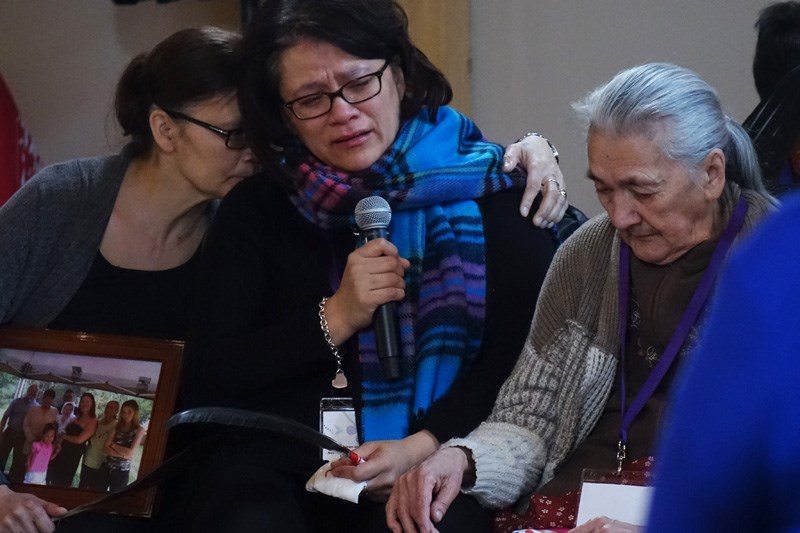When Dawn Anderson’s body was found outside her home in Leaf Rapids in November 2011, police pronounced her dead, removed her from the scene and ruled the cause of death to be exposure due to intoxication before calling her brother Keith Anderson and leaving him a voicemail to call the RCMP detachment.
When he did, he was told she was dead and that he should go get Dawn’s two daughters – aged 4 and 7 – from their house, where investigating officers had left them after loading Dawn’s corpse into a body bag and transporting it to the detachment in the back of an RCMP pickup truck.
Anderson went to pick up his nieces and found the house in disarray – the phone ripped off the hook, the TV screen cracked – and not so much as a strip of yellow tape around the area where his sister’s lifeless body was found.
“It wasn’t ribboned off, nothing,” he told the National Inquiry into Missing and Murdered Indigenous Women and Girls (MMIWG), which held community hearings in Thompson March 20-21, collecting the testimony of family and friends of Aboriginal women who were victims of violence or simply disappeared. “My gut feeling tells me there’s something that doesn’t sit right.”
Hilda Anderson-Pyrz, Dawn’s sister and also co-chair of the Manitoba MMIWG family coalition, said the circumstances around Dawn’s death warranted an investigation that never happened.
“All those telltale signs to me say that something went wrong,” she said, but despite a complaint to the RCMP commissioner, the force insists that the investigation was sufficient.
Lianna Anderson said the way her sister was unceremoniously dragged off after being identified by her neighbour, who was an RCMP officer, robbed Dawn of her dignity.
“She was basically bagged and put in the RCMP truck,” said Lianna. “She was not worthy of a call to the local doctor or the local ambulance.”
Dawn was pronounced dead over the phone by the chief medical examiner in Winnipeg, despite the fact that there was a doctor in Leaf Rapids.
“How the hell do you pronounce somebody dead over the phone?” asked Lianna.
Less than a day after her body was discovered, somebody set fire to the garage, where Dawn had reportedly been partying with a couple of men from Leaf Rapids the night before her death, in what police ruled was an arson.
“The whole investigation is just shot full of holes,” said Dawn’s brother Denis, who says even now, more than six years after her death, people tell him things they’ve heard about another resident of the town, who Dawn’s family believes may have been responsible for her death. “During a party he had admittedly said to a couple of people that he had a hand in my sister’s demise but he didn’t mean to.”
But when the family members go to RCMP to ask them to follow up these leads, they say they are just told to encourage the people they heard them from to talk to police themselves.
Liana says when the funeral was held, her sister had bruises on her face and arms.
“Everybody remembers those bruises on her because she was so fair,” Lianna said. “There are major red flags going up all around this.”
Comissioner Michèle Audette said Canada had failed Dawn Anderson and her family.
“It’s sad you have to be here,” she said, saying their anger at how her sister’s death was deal with is understandable. “I don’t know how you can come here without that anger after all that you explained to us.”
The commissioner said not only the federal government, but also provincial and municipal governments as well as First Nations and all Canadian citizens are responsible for making sure that more Indigenous women and girls don’t get killed or go missing.
“They have the power to change also,” said Audette. “They cannot deny any more. Canada needs to know what went wrong and why.”
Manitoba Keewatinowi Okimakanak (MKO) Grand Chief Sheila North Wilson, who was in the audience while the Anderson family give testimony, said afterwards that part of the solution to the problems affecting Canada’s Indigenous people is to give them more control over their own destiny.
“We know the solutions,” she said. “We want to take care of ourselves. We have the right to take care of ourselves.”
Anderson-Pyrz wants real answers for her mother about how Dawn died before it’s too late.
“I keep praying for answers before my mom goes so she can rest in peace,” said Anderson-Pyrz.
“My daughter was such a kind person too,” said Minnie Anderson. “I miss my daughter so much every day.”
Stories like the Anderson family’s have been told to the MMIWG inquiry all across Canada, said Audette.
“We can not say everywhere we go that it was an isolated incident,” said the commissioner.
“We’re not making this up,” said Lianna. “This is not Hollywood. This is real life. This is what we face in the north in our communities.”




